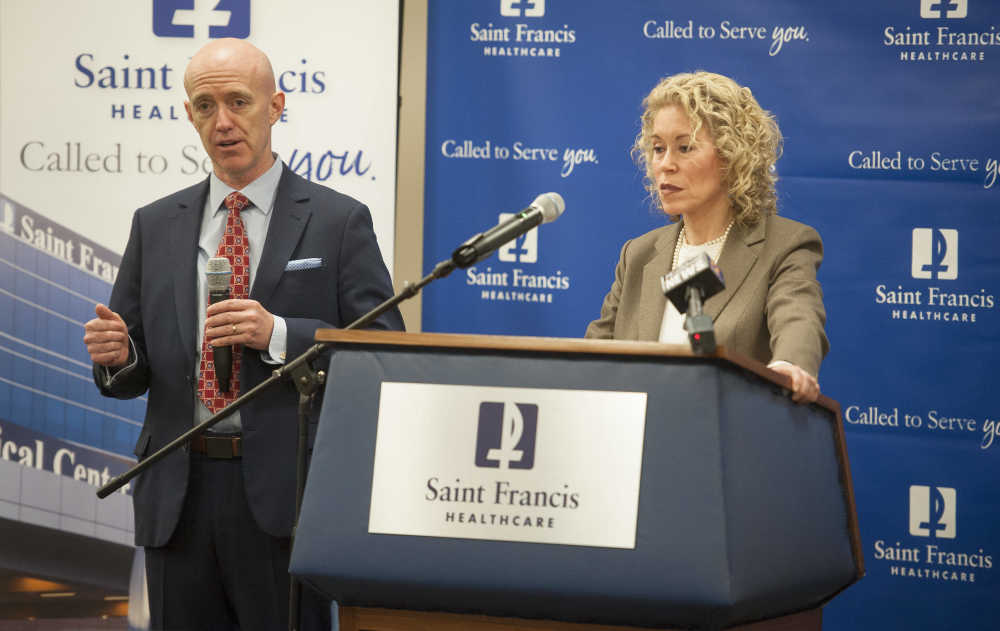Saint Francis vs UnitedHealthcare comes at risk to local residents

The Saint Francis press conference on Monday alternated between tough rhetoric, blasting UnitedHealthcare for leveraging people and crisis for profits, and a stated desire to negotiate. In a news release, UnitedHealthcare fired back comparing Saint Francis pricing unfavorably to urban rates — and decrying the Cape Girardeau-based hospital system as a reason for high medical costs in the area. Caught in the middle were some local employers and their employees who may end up with less coverage with United than they thought they bought only weeks before.
Meanwhile, some current patients at Saint Francis — among them: expectant mothers and cancer patients — are confronting what to do if the two sides don’t come to an agreement before March 5. Already anxious medical procedures just ratcheted up in concern.
One of the employers in the room, Gerdan Slipforming, was at the press conference to learn more — and not necessarily to be quoted in the newspaper. But its vice president, Blake Driskell, couldn’t hold back.
“We wanted to give options to our employees. It just feels like they’re pulling the rug out from under you. But I’ve seen this elsewhere, where the large guys basically bully the little guys into what they want.” Although Driskell was careful not to blame his local broker, whom he trusts, that was not his perspective on United: “It just feels like we were sold something that isn’t what we understood it to be.”
Another employer in the room, Jim Riley with Red Letter and Element 74, was even more vocal.
“I have two companies, and this is a big deal. We didn’t know anything about this when we were renewing with United. I just feel like I’ve been cheated,” Riley said. Editor's note: Riley's company Red Letter is currently under contract with Saint Francis for services.
For its part, UnitedHealthcare says that it attempted to resolve differences with Saint Francis but that responses were slow. Its main complaint: Saint Francis pricing is too high. Its news release reads: “The cost of care at Saint Francis Medical Center is nearly two and a half times more expensive than the average cost of the hospitals in our network in the St. Louis metropolitan area, where more competition among hospitals has driven costs down.”
One key aspect of the dispute is how Saint Francis has lowered prices in the past 13 months. Saint Francis officials point to lowering what is called their “charge master” by 15% on January 1, 2019, and then another 10% on January 1, 2020. Insurance providers negotiate their discounts off the charge master, so any reduction should redound to their and their clients’ benefit. Saint Francis claims United failed to pass those savings on — while not giving the health care system credit for its charge master reductions in the current negotiation. United responded by saying that its data indicated that the cost of care at Saint Francis actually increased for its members in 2019.
There’s a lot of attack, counterattack going on as the two sides take their negotiation public.
Here’s a few things I know.
Current Saint Francis officials acknowledge their pricing was too high for too long, which is why new CEO Maryann Reese has made it a priority to address costs and pass on the savings. There are also a lot of fine, honorable, talented people working at Saint Francis, who care passionately about their patients and who want to provide them the best outcomes possible.
That can be expensive.
One challenge of hospital medical care is that it’s more expensive to provide outside urban areas. There are many factors, including the relatively higher fixed costs spread over fewer patients, combined with the fact rural Americans are “on average, sicker, poorer, and more likely to be uninsured or underinsured, engage risky behaviors such as cigarette smoking or physical inactivity, and report worse physical and mental health,” according to a 2018 study in the North Carolina Medical Journal, “Rural Health Care Costs: Are They Higher and Why They Might Differ from Urban Health Care Costs?”
This study contends that when populations are normalized and travel is included, rural medical care costs less. Unfortunately, our system doesn’t work well to support it, causing many hospitals outside urban areas to close. One of the problems may be how insurance companies negotiate rates, forcing patients to “lower-cost” but distant urban providers.
At the press conference, Saint Francis repeated its hope to continue negotiations with United.
“We would like to negotiate with them and come to terms,” said Maryann Reese. “We would like to have a sustainable contract.”
And in its news release, United underlined its commitment to working toward the goal of reaching a new agreement, even suggesting room for compromise.
There’s just over a month left before D-Day on March 5. In the meantime, a lot of innocent people are caught in the middle. Here’s wishing them both success in their efforts — to lower medical costs while providing important local options.
Jon K. Rust is publisher of the Southeast Missourian.



Respond to this story
Posting a comment requires a subscription.